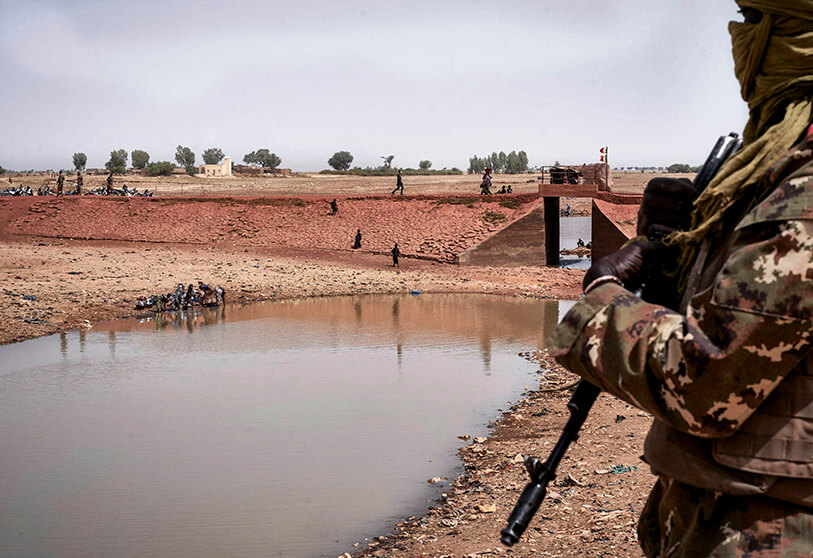In 2021, the average temperature of the planet exceeded that of the pre-industrial reference era by 1.11°C, according to a recent WMO (World Meteorological Organization) report on the global climate. This increase in temperature has had catastrophic consequences on the Sahel in terms of economy and health. Also, everything indicates that security impacts are to be feared in the near future. As a direct consequence and impact of climate change, huge population displacements and conflicts have already been observed.
In the Sahel, droughts are becoming more and more intense. Temperatures are rising 1.5 times faster than in the rest of the world. Deprived of income and food due to the lack of drinking water and pasture, the population must also face famine, which is increasingly threatening.
In addition, the continent is experiencing heavy rains. One would think that these rains would solve the harsh periods of drought, but the land is having more and more difficulty absorbing the sudden arrival of water. Destructive floods and numerous floods have thus been observed in Mali and Niger in 2019, with all their negative consequences, both on the population and on agriculture and livestock.
Among the impacts of climate change, we note an increase in temperatures and a rise in sea level. Climate change has also jeopardized already fragile food security.

According to the Food and Agriculture Organization of the United Nations (FAO), since 2012, the drought has caused a 45.6% increase in the number of undernourished people.
For its part, the International Monetary Fund (IMF) estimates that the most damaging economic consequences will be seen in regions with warm climates, where many countries with chronically deficient economies are located. The African Centre for Climate Policy predicts that African countries will experience a decline in GDP of 2.25 to 12.12 percent by 2050.
The IPCC projections foresee dramatic scenarios on agricultural production and food security. The most pessimistic option predicts a 10% reduction in average yield in Africa. As a result, it is likely that population displacements, which are already significant, will increase in the coming years.
Rising temperatures and changing rainfall patterns will also have a significant impact on health in Africa. Insects, especially mosquitoes, reproduce very quickly in hot and humid regions. It is feared that the transmission of diseases such as malaria, dengue and yellow fever will increase alarmingly.
Rising temperatures in the Sahel are causing more droughts and floods, reducing agricultural production and increasing poverty. These situations fuel intercommunal violence that jihadist groups exploit.
As far back as 2008, a report called Solana addressed the direct threats and impacts of climate change in terms of international security: conflict over resources, economic damage and risk to coastal cities and critical infrastructure, border disputes, environmentally induced migration, situations of fragility and radicalization. All of these elements are a boon to terrorist movements that take advantage of crises to recruit new fighters and increase their influence in the regions where these crises are occurring.
If we take the example of the Sahel, particularly around Lake Chad and in the West where terrorist movements continue to spread, we can see the links between climate change and terrorism. Desertification and water scarcity have led to a scarcity of resources, which has fueled ethnic conflicts between nomadic herders and farmers since the 1990s. In central Mali, terrorist groups have exploited these growing tensions to recruit members who feel excluded and stigmatized. In this case, the impacts of climate change are disrupting transhumance cycles, with herders having to travel longer distances and spend longer periods of time in the region occupied by sedentary farmers and therefore far from their area of origin.
“Thus, in the Lake Chad Basin, Boko Haram has been able to mobilize new recruits, particularly among local communities disillusioned by the lack of economic prospects and access to essential resources,” notes the UN Secretary General.
Also, the desertification of certain regions as well as the lack of resources and insecurity can lead to population displacement. The displaced represent a considerable challenge for the continent: the United Nations estimates that 86 million Africans could be displaced within their country by 2050. This is a major challenge because it will undoubtedly add to the pressures already being exerted on the food and health systems of the cities and regions concerned.
Jihadist groups such as JNIM, ISGS or Boko Haram are already taking advantage of all these crises, both climatic and human. For example, in 2016 in Burkina Faso the lack of public services, injustice, climate change are elements that helped the birth of Ansarul Islam.
But it should be noted that global warming is not everything. It is an element that aggravates an already sensitive situation and which includes several causes, economic, social and political. Fighting against global warming to overcome insecurity is like fighting against the symptoms of a deeper disease.
